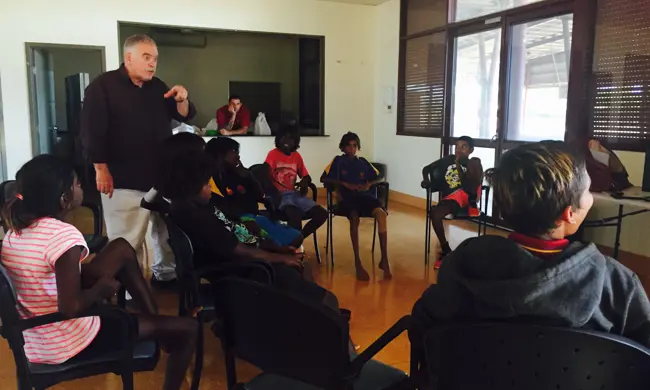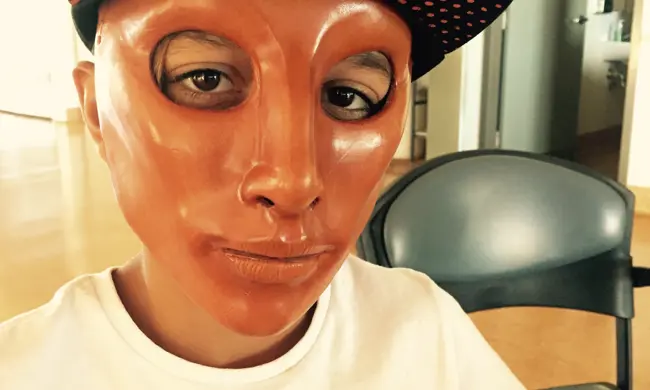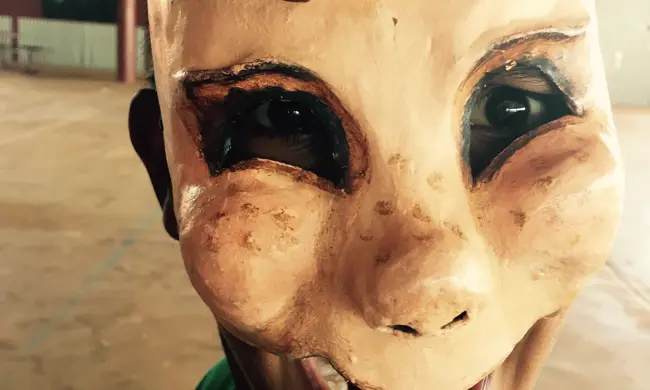Theatre of Transformation Project - Halls Creek
The Theatre of Transformation project was community-based activity which aimed to create a safe space to support a group of young Aboriginal people 12 years and older to write, rehearse and present their own play for the Halls Creek community that captured and communicated their experiences of alcohol-related harm.
Click below for more information on this project.
Overview
The two-week project was conducted in Halls Creek by the following project partners:
- Kimberley Community Drug and Alcohol Service (KCADS)
- Melbourne based theatre director, Bryan Derrick
- the local Aboriginal Medical Service, Yura Yungi
- Halls Creek High School.
It was expected that the final product would be both compelling and confronting, and act as a trigger for parents, carers and the community to listen to their children’s description of the profound and damaging impact alcohol was having on the younger members of the Halls Creek community.
Like many remote communities in the Kimberley Region, the incidence of alcohol-related harm in Halls Creek far exceeds state averages.
The project partners chose to work with this group of young Aboriginal people because they are deeply affected by alcohol-related harm but rarely have an opportunity to voice how it affects them or to exert any influence on how to prevent or treat it.
Project development
Theatre of Transformation has a number of theatre models that aim to give voice to the lived experience of the voiceless. The forum model was adopted as it is a short and powerful style of play comprising a number of scenes where dialogue is kept to a minimum and, at the end of the play, audience members are invited to suggest how a better outcome could have been achieved and to act out their suggestions with the actors on stage.
A significant lead time was required to develop a joint program between the project partners.
Key considerations for the project included:
- Ensuring the young people had the full support of their primary carers to participate in and out of school hours
- Ensuring permission was given before photos and videos of the young people were taken and shared
- Providing a safe, quiet and secure space for rehearsals.
- Identifying and managing cultural security - attention was given to what topics could be included and what may be contentious.
The project partners were also mindful that the content of the play may provoke strong emotional responses in participants, some of whom were considered at risk. The project partners identified these young people and developed a strategy to manage and mitigate this risk, which would include:
- Ensuring the students’ teacher and an experienced, well-known personal helper and mentor from Yura Yungi attended all rehearsals and the public performance
- Ensuring an experienced drug and alcohol counsellor, and a team leader and psychologist from the Social and Emotional Wellbeing team at Yura Yungi was on call during the rehearsals, and attended the public performance
- Negotiating as a group, a code of conduct before rehearsals started based on zero tolerance, which would be applied equally and without exception
- Children attended the performance only if they were accompanied by a parent or adult carer
- Early warning signs were monitored, and early intervention, such as time out or break away groups with one or more students, were applied as required.
A number of initiatives were implemented to promote the project:
- Flyers were designed and posted among the community, town camps and outstations a month before the project start date.
- Radio interviews with staff from the partner organisations and the director were conducted on local radio PRK. This provided the opportunity for the project partners to issue an invitation to interested actors and their families to attend a community barbeque.
- Project partners visited stakeholders in town to introduce the director and talk about the forum theatre model. This included visits to the high school and Kimberley Training Institute, where the director entertained the students with storytelling and invited them to attend the community barbeque, and subsequent rehearsals.
- The director met with local Aboriginal elders for dinner to talk about the project and listen to the elders’ stories and advice.
The key lessons learnt during this phase included:
- Effective coordination and collaboration between partners is critically important during the lead up phase
- The importance of recognising and harnessing partner capacities (for example, Yura Yungi made valuable contributions regarding the risk of trauma and how best to respond)
- Being aware of the project partner’s capacity gaps to avoid attributing a role to them that they are unable to fill.
Implementation
Twenty male and female Aboriginal young people attended the first day of rehearsals but, over time, the young people in attendance ebbed and flowed. A core group of eight actors developed. Unexpectedly this group was made up of high school students whose academic performance and attendance were the lowest amongst their peers.
The rehearsal process included:
- Negotiating a code of conduct; the group identified unacceptable behaviour and agreed on consequences. While the project partners had planned on a zero tolerance approach, the group reshaped the policy and decided instead to take a ‘three strikes and you’re out’ approach
- Ensuring the director, one of the personal helpers and mentors and the actors’ high school teacher were present at each rehearsal
- Having the actors share their stories and using them to write the play
- Assigning the characters and agreeing on a running order
- Providing healthy lunches and drinks.
The play, which they called ‘Given Half a Chance’, told the story of a young Aboriginal boy who has a father who drinks heavily. The drinking leads to family violence directed at the boy’s mother. The pressures at home causes the boy’s poor performance at school, his subsequent drift into petty crime, a car theft, a fatal accident and a broken hearted mother.
On the day of the final rehearsal, the main actor developed stage fright and returned to his home on a station outside of the town. The group’s response was a last minute reallocation of roles so the public performance could go ahead as planned.
The final performance was held on 4 June 2015 and the audience included family members, the principal and teachers from the high school, the local radio manager who operated the lights, and the KCADS and Yura Yungi teams.
The key lessons learnt during this phase included:
- A safe, secure, private space for rehearsals, shared only with their peers, the director, their teacher and one of the personal helpers and mentors, meant that actors who felt shy, ashamed or vulnerable had the support to work through these emotions.
- At the first rehearsal the director suggested that he call the group ‘actors’ rather than by their first names and all agreed. This moniker removed any negative connotations associated with their real names and encouraged participants to re-invent a more positive version of themselves.
Follow up
After the public performance, a number of evaluations occurred:
- Project partners spoke to the actors and audience about the highlights and challenges of the project, and the courage and skills of the actors. This included the young actor who had stage fright and did not perform.
- Once the audience had departed, all involved in the production gathered to share their experiences, with feedback overwhelmingly positive and the actors inordinately proud of their achievements.
- Project partners met to debrief without the actors, focusing on critical success factors and constraints as well as lessons learnt.
The final performance was viewed as a remarkable and courageous achievement by the young actors, and the director gave one last radio interview to thank the community for their generosity and participation. A month after the performance, one teacher reported that the project had had a significant and positive effect on her high risk group of students.
“This project empowered students at educational risk to create and perform their own plays. Students responded exceptionally well, attending rehearsals during school and after school hours. This was an incredible surprise as some students who would rarely come to school whole-heartedly participated in the creation and performance of the play. The success of this project has empowered students to feel a strong sense of achievement and it has inevitably increased their confidence in themselves and in their learning.”
The participation of young Aboriginal people was critical to the success of the project, while the adults provided the space, cultural security, privacy and boundaries. In this context, young people produced and performed a play that was an honest and confronting representation of their lived experience of alcohol-related harm.
The project had high levels of community support, and the high school was a strong and willing partner, offering its Performing Art Centre for use by KCADS to stage the next Theatre of Transformation project.



Next steps
The project team discussed what could be done differently in the future.
- When consent for a young person had not been obtained, or a young person was new to the group, the decision was to stay in town to ensure our duty of care needs were met. You need to learn to be flexible when operating in communities that experience transience.
- It is recommended that various communication tools are set up at the beginning of the program – whatsapp, instagram etc to ensure communication with kids.



